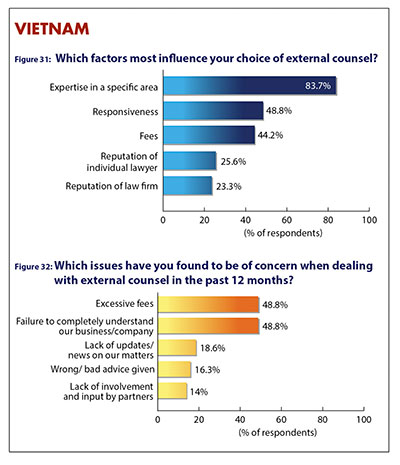By founding partner Hoang Nguyen Ha Quyen and associates Nguyen Thi Thu Trang and Pham Minh Duc
In recent decades, “collaborative economy”, also known as “sharing economy” or “peer-to-peer economy”, has developed significantly and generated colossal profits worldwide. According to research by PwC, global sales of all companies involved in collaborative economy was US$15 billion in 2014, and is forecast to expand 22-fold to reach US$335 billion by 2025.
Collaborative economy was newly introduced in Vietnam following the entry into the market of Grab, Go_Jek, Airbnb, WeWork, VATO, Gonow, T.Net, Traveloka, Triip.me, lendbiz.vn, tima.vn and a few other household names. The term “collaborative economy” has recently been discussed and reviewed in many e-commerce and business forums. The model has been praised by businesses not only for its profitability but also ability to benefit the society significantly.
This article will provide a definition of collaborative economy, its benefits and challenges, and legislation and management for collaborative economy in Vietnam.
Collaborative economy
Collaborative economy is a socio-economic system to facilitate the sharing of human and physical resources. It typically utilises online and mobile platforms to link customers with providers.
According to the classification method of Judith Wallenstein and Urvesh Shelat, collaborative economy can be divided into three main categories:
- centralised platform model (the platform provider concurrently owns products or services and determines their price);
- decentralised platform model (the platform provider only creates the platform, the seller/service provider decides the price of products or services); and
- mixed platform model (the seller/service provider provides the product/service at the price determined by the platform provider and the platform provider plays a part in product/service quality assurance).
Benefits of collaborative economy
One of the benefits of collaborative economy is that it provides new opportunities for multiple stakeholders. Innovative entrepreneurs can take advantage of the Internet to create new platforms for vendors to sell goods or provide services. Vendors and consumers also benefit from this model: the former can use the platform to save costs, while the latter can buy products or use services quickly and at a budget price.
In addition, the development of collaborative economy also helps to promote the development of domestic companies. For instance, the participation and strong growth of two globally well-known passenger transportation service providers, Grab and Uber, in Vietnam have strengthened the national collaborative economy. Their appearance has caused major domestic traditional passenger carriers such as Mai Linh or Vinasun to change the way they operate. By end of 2015, both have launched their own version of taxi-hailing mobile applications to allow passengers to order rides without calling the call centre.
Moreover, collaborative economy also produces positive impact on the environment, improves economic efficiency, and reduces waste of social resources and surplus of products and services.
Challenges of collaborative economy
Despite its benefits, collaborative economy also presents many challenges.
First is the lack of regulation given the relative novelty of the collaborative economy model. This can lead to an uneven playing field where traditional businesses are subject to tight regulation while collaborative economy companies are not administered adequately.
Second, quality of products and services also concerns customers. If the platform providers only provide a platform for the vendors, the quality of the products or services may not be guaranteed.
Third, information security is another problem area. Recently, there has been many cases of customer data breach in Vietnam.
Legislations and management for collaborative economy in Vietnam
In general, the current legislation such as the Law on Investment 2014, the Law on Enterprises 2014, and other legal regulations regulating financial obligations and other policies do not have specific provisions on collaborative economy. As mentioned above, because there are different types of collaborative economy (ie centralised, decentralised, or mixed platform model), determination of applicable regulations is likely very complicated. This is considered one of the causes for Vinasun, a traditional Vietnamese taxi provider, to bring Grab to court claiming that Grab causes significant losses to them. Similarly, determination of management authority over collaborative economy companies is also an issue, given the functional overlap between various government ministries.
In addition, there is also a lack of regulations on quality management of products or services sold on online platform. In particular, there is a need to clearly define consumer protection obligations relating to the activities in collaborative economy.
Furthermore, online network is prone to data privacy risks. Regulation on information security does not clearly delineate the parties’ responsibility when the information is leaked, lost, or more seriously, sold without the consumer’s consent.
Therefore, promulgation of regulations on regulating and managing collaborative economy is extremely urgent. New regulations need to govern business operations, ensure a favorable environment for it to develop, and create an equal competitive environment between collaborative economy and the traditional business model.
Recently, Prime Minister Nguyen Xuan Phuc has issued Decision No. 999/QĐ-Ttg dated August 12, 2019 on facilitating collaborative economy in Vietnam. The Decision has stated the timeline for and cooperation between the ministries to propose plans for management of collaborative economy. This promises a clear and effective regulatory environment for collaborative economy investors to invest in Vietnam.





















 LNT & Partners
LNT & Partners Nguyen Anh Tuan
Nguyen Anh Tuan Bui Ngoc Hong
Bui Ngoc Hong Nguyen Ha Quyen Hoang
Nguyen Ha Quyen Hoang





